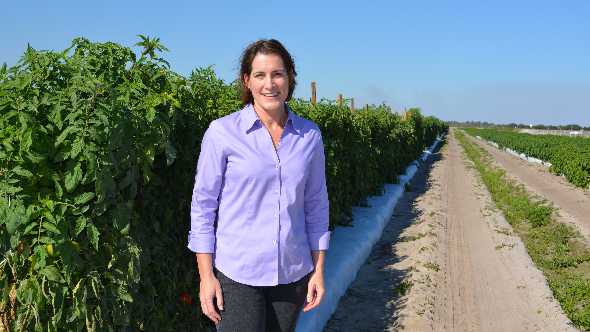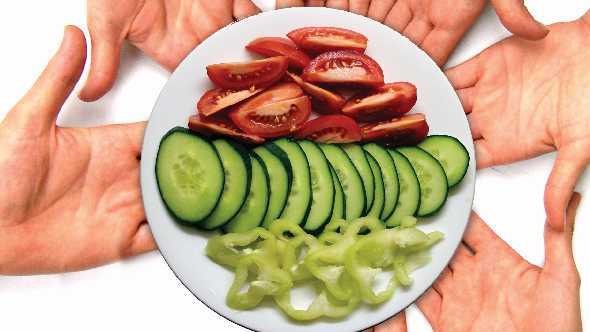Food Safety Recall Survival Tips
The prospect of a recall is unsettling and can happen no matter how well growers and packers manage their food safety practices. So, understanding how they work and knowing the right questions to ask when the FDA comes calling is key to successfully navigating the process.

Photo by Frank Giles
Amy Philpott provided her food safety recall survival tips to attendees of the recent Seminis Southeastern Vegetable Variety Field Day held at the company’s Felda research station. Philpott is a senior director with Watson Green LLC — a food and agriculture policy and public affairs company. Specializing in crisis and reputation management, Philpott handles about one produce recall every month.
She began her presentation by asking attendees how many of them conduct mock recalls. There were a smattering of hands raised in response.
“A mock recall will do you no good if you face a real recall,” Philpott said. “Let’s call them what they are — a traceability exercise. They are very important, particularly in a recall, but that’s all they are. They will give you absolutely no indication how prepared you are to handle a real recall.”
Not So Voluntary
When a produce item is in the marketplace and is suspected of being the cause of a foodborne illness, FDA has traditionally relied on voluntary recalls by growers and packers if items are traced back to these origins. However, under the Food Safety Modernization Act, FDA will have mandatory recall authority.
“Everybody says FDA will now have mandatory recall authority,” Philpott said. “In effect, they have always had mandatory recall authority. If FDA came to a company and said your product has proven to be contaminated and poses a risk and requests a recall. If the company says no, FDA says, ‘OK, we will just issue a news release with your company’s name and say your product is contaminated — and you are not cooperating with officials.’”
Recalls Happen
Philpott noted the vast majority of produce recalls are class 1, which means they pose a reasonable probability of serious adverse health consequences or death. So, what happens when FDA contacts you requesting a recall?
“During a Class 1 recall, the FDA will expect you to remove the product from the marketplace at the consumer level,” she said. “It doesn’t matter if the product is eight weeks old, typically expiration date or shelflife doesn’t matter. Notification at the consumer level must happen and generally requires a news release. You also must notify your consignees via a letter. The FDA will want to know where the product has been shipped to.”
During a recall, consignees will be sent an effectiveness check form, which contains several questions FDA will use to determine how well the recall is going.
“FDA says 100% effectiveness (from consignees) is what it is looking for, but if you can achieve 85% to 90% effectiveness in this area, you should be all right,” Philpott said.
When a recall is under way, FDA can go anywhere the product goes. Philpott said that means the farm as well.
“If FDA samples bell peppers at the distributor’s warehouse and it tests positive for some foodborne pathogen, they will look at the name on the box to learn where it is coming from,” she said. “They will go to your farm and conduct interviews and take hundreds of samples. They will sample soil, water, equipment, packing lines, drains, doorknobs, and more.”
Many times FDA and state investigators will team up on inspections. Philpott said as many as five to eight inspectors could show up at the farm depending on how busy the agencies are and how serious they believe the food safety threat is.
When The Phone Rings
Philpott stressed that once you tell the FDA you agree to a recall, there is no going back. For that reason, she encourages growers to be prepared and to know the right questions to ask when FDA comes calling.
 “How well you will survive the recall depends on what you do before the FDA calls,” she said. “I can tell you the company that has not prepared is going to spend more money and risk losing the confidence of their buyers. Many buyers I deal with say the fact you are having a recall is not always entirely the problem, but it is how well the company is prepared to handle one when it happens that matters most.
“How well you will survive the recall depends on what you do before the FDA calls,” she said. “I can tell you the company that has not prepared is going to spend more money and risk losing the confidence of their buyers. Many buyers I deal with say the fact you are having a recall is not always entirely the problem, but it is how well the company is prepared to handle one when it happens that matters most.
“Obviously, they are not going to be happy, but if they see you are going about the process in a very deliberate manner and things are under control, they generally won’t jump ship and start buying from somebody else.”
When FDA calls regarding a positive foodborne illness test, there should be a pre-designated person who will be responsible for taking the call and then a backup person in line if that person is not available.
“This is not a call that goes to voice mail,” Philpott said.
The designated person should be equipped with questions to ask FDA regarding the potential recall. Verify who the FDA caller is with contact information (name, title, address, phone, and eMail). Ask about product details. What type of produce was it? What kind of packaging was it in? Was there a sticker on it? What was the brand?
“Ask the FDA how the problem was detected and why do they believe the product was contaminated at your farm or facility,” she said. “If there is confirmed test results, ask for the lab sheet and have a microbiologist confirm the results.
“Ask if there have been any reported or linked illnesses. There is a difference between the two. A linked illness means I have a DNA sample of a pathogen that was found on your product and it matches the DNA in a stool sample of a sick person. A reported case is simply somebody calling in and saying, ‘I ate tomatoes and now I am sick and the doctor says I have salmonella poisoning.’”
Philpott also suggests asking who else FDA has been in contact with regarding the test results.
“If a sample was taken at the wholesaler or retail level, presumably they have told them, but ask to be sure.
The company also will be required to separate out lots of produce affected by the recall.
“FDA defines defensible separation as how you break out lots and justify there may have been a problem with a box in lot ABC, but not in lot DEF,” Philpott said. “How do you justify not recalling the lot before or after? What happened in your process to satisfy FDA that the lots before and after the implicated were treated differently?”
Communicate Effectively
Philpott said many companies focus so much on the mechanics of a recall that they often overlook the communication aspect of the process.
“You can do everything absolutely right on the technical side, but if you can’t communicate it to the right people in the right way, it won’t matter,” she said. “You won’t get credit from your customers, your consumers, and in some cases, FDA.”
Philpott said the bare minimum of parties where communication will be important include the FDA recall coordinator, consignees, customers, state/county health officials, company employees, trade media, and consumers.
“Don’t forget your employees,” she said. “They are going to worry about the future of the company and are going to be asked about the recall at church or the soccer game. You want them to be as informed as they can be, so they can be an ambassador for the company.
“And, don’t forget consumer communication means going through the media and social media to inform about the recall. And provide as much information as possible to help them identify the product. Companies hate using photos, because they don’t want to see their brand in that negative light, but if you don’t do it, the consumer will not know what to do. You will end up taking back a whole lot more of the product than you recalled. That will happen anyway, but if you don’t show them the product, it will be much worse.”










